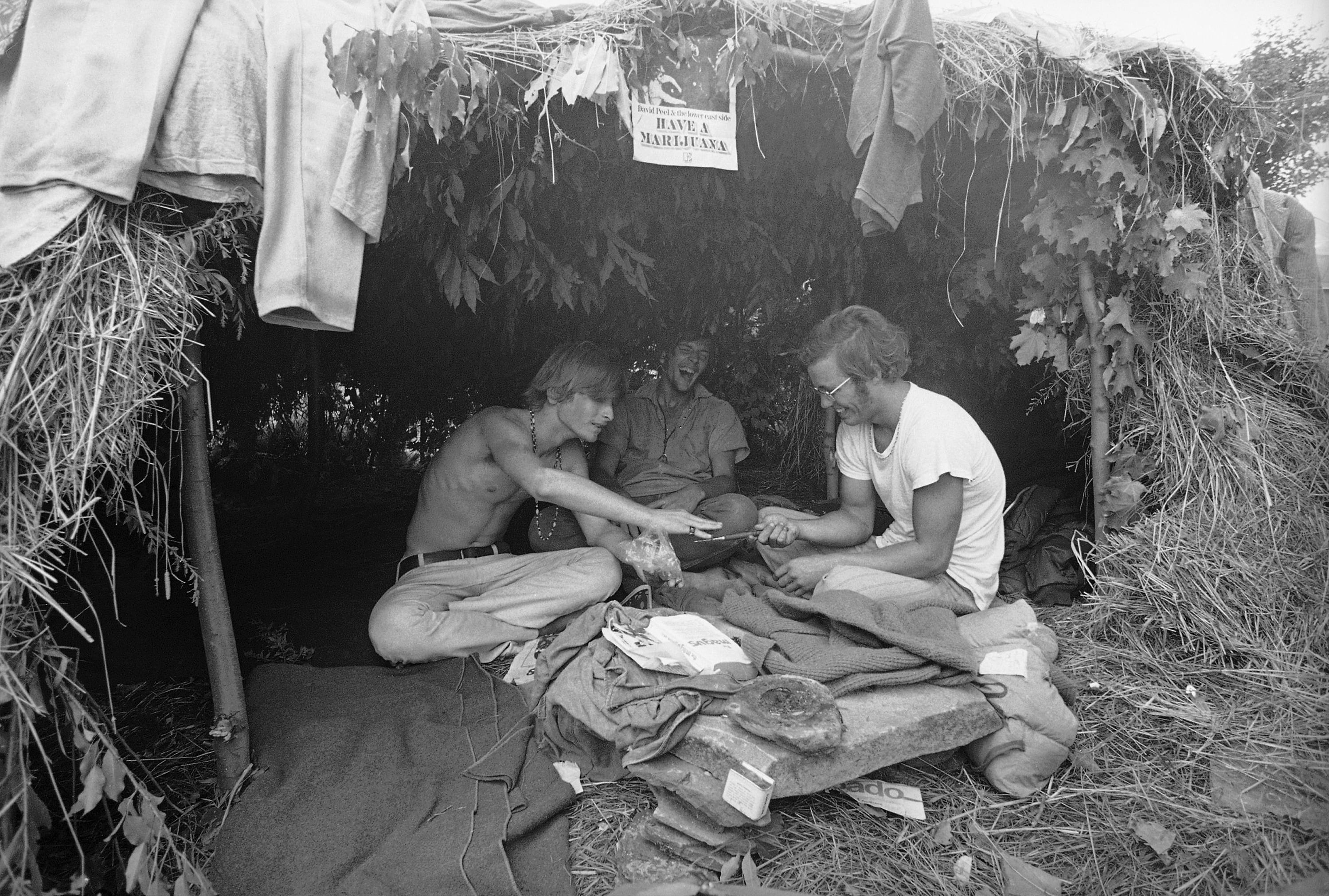Few musical acts are more associated with one particular time period or event than Creedence Clearwater Revival is with the Vietnam War.
Songs like “Bad Moon Rising,” “Proud Mary,” “Green River,” “Down on the Corner,” and perhaps the tune most associated with 'Nam, “Fortunate Son,” made 1969 the year of John Fogerty and the band that Rolling Stone penciled in at number 82 on their list of 100 Greatest Artists.
Album success of that year was, as music lovers know, coupled with CCR’s performance at the legendary August 1969 Woodstock music festival, an event that was due to celebrate its 50th anniversary with a commemorative 2019 concert that Fogerty had excitedly signed on to play.
But when planning for this year’s event unraveled, the Army Reserve veteran pounced on the opportunity to divert the resources Woodstock 50 would have garnered toward something he and his wife considered just as worthwhile.
Fogerty spoke to Military Times about Woodstock’s cancellation, his military service, the power of music, and the wars in Vietnam, Iraq, and Afghanistan — everything was on the table — ahead of the Nov. 11 release of “50 Year Trip: Live At Red Rocks.”
’50 Year Trip’ commemorates the first time you played in Morrison, Colorado’s picturesque Red Rocks Amphitheater in 1969. What was it like returning after all these years?
It was magical. We had been to Red Rocks as a family a few times when my boys were quite young — four or five years old. And so now we came back for this wonderful show, but my boys are grown up and in my band, so we’re there as a family again, but now we’re all working.
You know, it’s really ironic and it just warmed your heart. I mean, as a family, you just feel so happy that something this neat could happen.
Unfortunately for music lovers, Woodstock 50 never came to fruition, but you were able to flip that into something special for veterans. Can you discuss that?
I remember the day they finally threw in the towel and admitted that Woodstock 50 wasn’t going to happen. Basically, the thing had gotten so shaky over time that everybody demanded to be paid up front.
And when it didn’t happen I said, well, I come from a generation that isn’t really used to getting paid for doing nothing. I’m gonna to donate mine. And here we are.

There’s a guy in Vegas who has a place called Veteran’s Village. He’s converted hotel properties and other resources to housing for veterans. He even converts these massive shipping containers into freestanding homes. So that’s what we wanted to give to, and we’ll get to donate a home to a veteran and his family, who will actually be able to start living in it on Veteran’s Day.
It’s such a wonderful project and I’m hoping it will be seen as a model that other people can follow. Obviously, it’s much more efficient than building a house from scratch, and it’s doing something to help homeless veterans, which is certainly a problem we all recognize.
This desire to help had to have been spurred on, at least in some way, by your own military experience. What was your time in uniform like?
I was really just a normal American kid who felt we have pretty great country. I think I had a normal sense of patriotism, but I never dreamed I would grow up and be in the military. If anything, I wanted to be a baseball player or certainly a musician. (laughs)
Then the Vietnam War really started to get going, and sooner or later, I was drafted, just like so many million other guys. It wasn’t something I envisioned or even wanted to do, but there I was, and you’ve got to do something with it. Eventually, I was assigned to an Army Reserve unit.
I was a very fortunate young man at the time, because in those days at least, the Army Reserve wasn’t really going overseas. After reading some books later on Vietnam, I’ve kind of learned that certain Army Reserve units were in discussion to get activated. I never knew how close we all could have come to going overseas.
I was just a normal kid and really didn’t see myself becoming any kind of a military hero. The war was very unpopular. Even with us in the military — we weren’t in love with that war. Nobody really wanted to go fight in a jungle.
Civilians at the time didn’t seem to understand that. That’s probably the first thing that everybody got wrong was thinking we wanted to be over there. No, I wanted to survive!
You know, we were just normal people with common sense.

You were honorably discharged in 1968. How had your military experience changed you from your early days of being ‘just a normal kid?’
The war in Vietnam was still going, of course, as were all the cultural things that we look back on from the time — hippies, protests, marches. That was just the turmoil of America in those days. Many of my friends were musicians, hippies, or just normal citizens who would all protest the war.
Sometimes I’d be performing at a protest, and we’d get into a discussion and they would start hurling epithets if there was a guy in uniform, and I’d think, that guy over there is only 19 years old. He’s the same as you. He likes the same songs on the radio, he likes the same rock stars, eats the same food, loves the same movies, and doesn’t like the war. He’s not some alien, he’s just a poor guy who got drafted and now he has to find it within himself to do his duty, which luckily you don’t have to worry about.
And they really didn’t understand. They’d say, “What made John so hot?” But that was just the God’s truth. And eventually, that sort of feeling continued to take shape when I’d notice sons of senators and other well-off people not having to do their military duty even though they were eligible. That ticked me off.
That basically was the genesis of my song, “Fortunate Son.” It was coming straight from my heart.
Lord knows I’d had a little bit of rehearsal time in talking to my peers about what kids in the military really feel. And after the war was over, I’d see soldiers come home just to have the public turn our backs on them. That just made me really sad, and eventually, angry.
They didn’t go to Vietnam because that’s what they wanted to do, but they did it. And they should be proud, but they came home to a country that wasn’t. With all the additional problems they face, how can we do any worse by these people?
So, being a guy who kind of lived on both sides of that world, I always wanted to see where I could try and help out.
It certainly sounds like you took some lessons away from your time in uniform. Were there any lasting impressions from the military that you applied to your music career?
Some of the lessons I applied to music were just part of the way I was raised in 1950s and ’60s America, but the military certainly reinforced some of those.
When I was getting ready to leave the military and Creedance was just starting to make some noise, I went and saw a movie — I can’t remember what it was — but in the movie, this general who’s leaving a battlefield and giving up command tells the incoming officer to remember one thing: When you put on the clothes of a general, you have to be a general.
This meant you’re going to have to give a lot of orders that are unpopular, but that’s the way you have to do it.
And that’s a universal truth. I was applying it as a leader of the band when I was starting to try to shake my guys into shape, so to speak, with more discipline to try and get better. Giving orders or direction, there were times I had to remember that lesson.
You touched on the genesis of “Fortunate Son.” Music can obviously be a powerful vehicle of change or therapeutic — for military personnel just as much as anyone else. Were there any particular bands or artists who impacted you in the service?
I don’t remember which base it was, Fort Bragg or Fort Knox, but one of the guys came home from the PX with a record player, and he had three or four albums that we loved.
One was the Doors’ first album, which had “Light My Fire” on it. Then there was one with Eric Clapton, as well as the Beatles’ “Sgt. Pepper’s Lonely Hearts Club Band.”
And then there was a record called “Surrealistic Pillow” by Jefferson Airplane. That was the album with “Somebody to Love” and “White Rabbit.” We loved listening to the Airplane. There was a beautiful song on that album called, “Comin’ Back to Me” that just tugs at your heart. It’s so beautiful.

Anyways, even though I was on American soil, there’s still a feeling of being cut off from home, so I can only imagine how it felt being a soldier in Vietnam. But music has a way of closing that distance.
I heard countless stories later when the war was over from guys my age telling me how the music gave voice to their feelings. I remember hearing one guy talk about the song “We Gotta Get out of This Place” by The Animals, and I could just imagine all those guys singing that at the top of their lungs.
Music is very important, especially when you’re young. You know, maybe when you’re an old guy in your 60s and there’s stuff like house payments and insurance bills, the idea of singing along to a 1965 rock song might feel a little funny, but when you’re young, that’s just how you are.
One last question. Obviously your music is heavily associated with Vietnam, which, like today’s wars, had its fair share of controversy. If you were going to write music about this generation’s conflicts, what type of message would you hope to send?
I think I would call it the same way I did back in the ’60s. It’s like, wait a minute, hold on here, I’ve seen this before.
Hoodwinking the American public with the spectre of weapons of mass destruction was like seeing a current version of the Gulf of Tonkin Resolution all over again, all as a means to sway the public into thinking that going into those places was acceptable.
And the sad thing about it is, especially with Iraq or Afghanistan, when you get involved over there, you can’t leave. If we leave, then it will just be the same thing that happened with Vietnam. The whole thing could just collapse, and all that time you spent there becomes nothing.
So, not that I have an answer for that particular quagmire — I don’t — but with the music, it would just be an effort to at least caution the public to not let the big muckety-mucks talk you into any more commitments of sending your sons and daughters off to a war that you don’t even understand.
We should be much more careful with the lives of our kids.
Thank you, John Fogerty, for the time. John’s “50 Year Trip: Live At Red Rocks” can be seen in theaters nationwide on Nov. 11. Tickets can be purchased through Fathom Events.
J.D. Simkins is the executive editor of Military Times and Defense News, and a Marine Corps veteran of the Iraq War.





